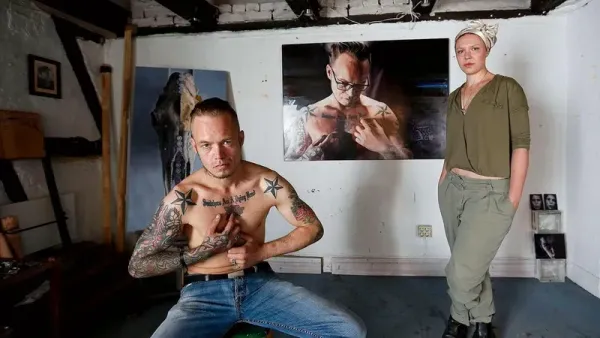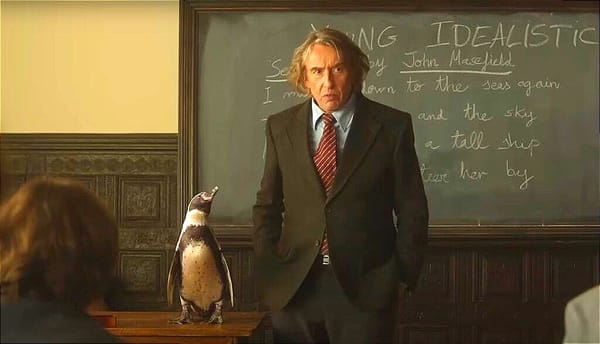Toronto Film Festival Report, Part II
Nine movies and moments from a quiet TIFF 2023
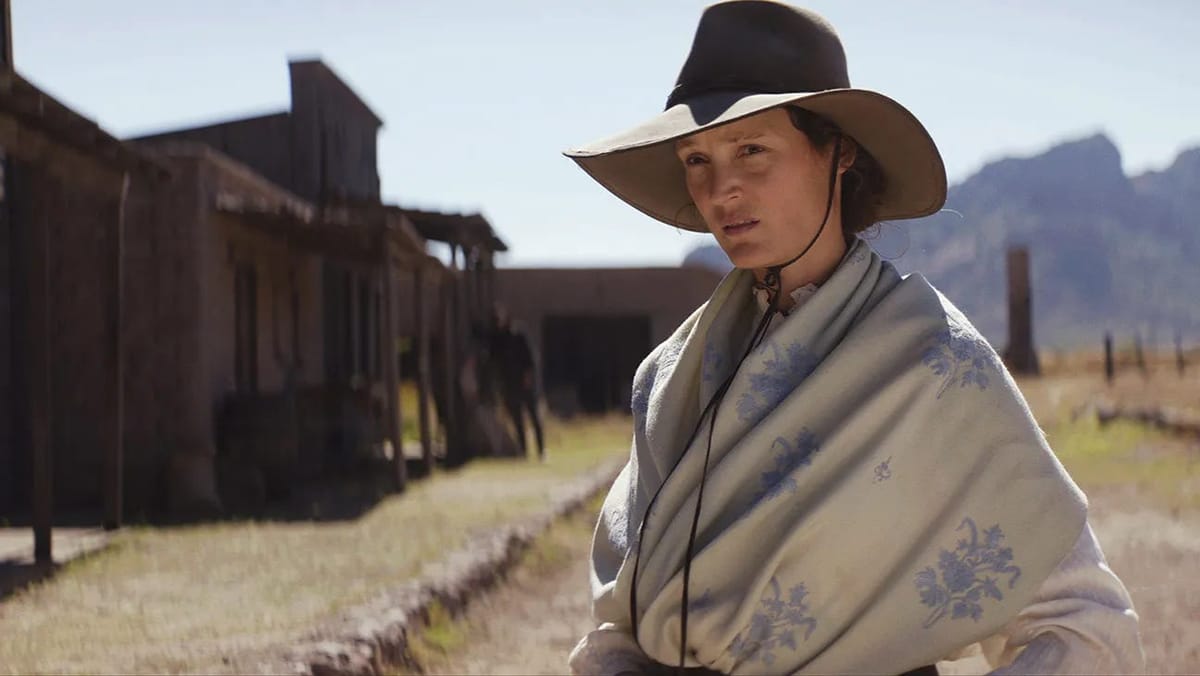
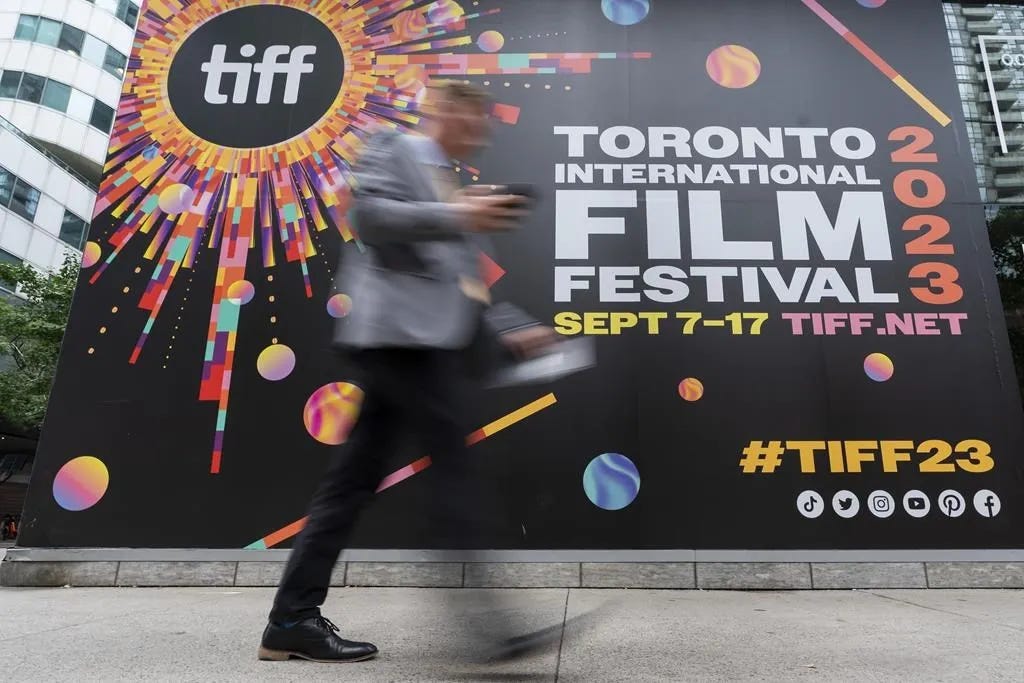
Five days into a ten-day festival, and there hasn’t been a TIFF 2023 “wow” movie – the one that unites audiences and critics alike in a glow of discovery*. Maybe it’s just not that kind of year, but I will say that my ratio of good to mediocre has been reasonably high, and while there’s been word of a few outright stinkers, I’ve been lucky enough to avoid them. (A few films, predictably, have exposed the split between “popular” and “good,” with Taiki Waititi’s “Next Goal Wins,” a comedy about the American Samoa soccer team from the “Jojo Rabbit” director, a big hit with Toronto audiences and a big no-thanks from my critical colleagues. I have yet to see it; it comes to theaters Nov. 17.)
Speaking very personally, what has been striking have been the number of movies that relate directly to events in my own life, like the one about three sisters dealing with their father’s final days in hospice, which I screened at TIFF 2023 a little over a year after watching my wife and her two sisters go through same. Or the one set in a New England prep school in the early 1970s. Or another that featured family conversations eerily like ones that have unfolded in my own kitchen. Movies are a window onto other worlds, yes, but sometimes they’re mirrors onto your own, and, when they’re good at what they do, they can show you angles of perspective you might have missed the first time around. Here’s the latest on what I’ve seen at the festival; more to come in the next few days.
*Two examples that come to mind. 1) A daytime Sundance press screening of “Beasts of the Southern Wild” in 2012 after which I and the storied film critic Amy Taubin and I staggered out into the sunlight and looked at each other with jaws agape. 2) A first-night Sundance screening of “Whiplash” (2014) that ended with a smash-cut to black, a moment of stunned silence, and then a roar of audience approval.
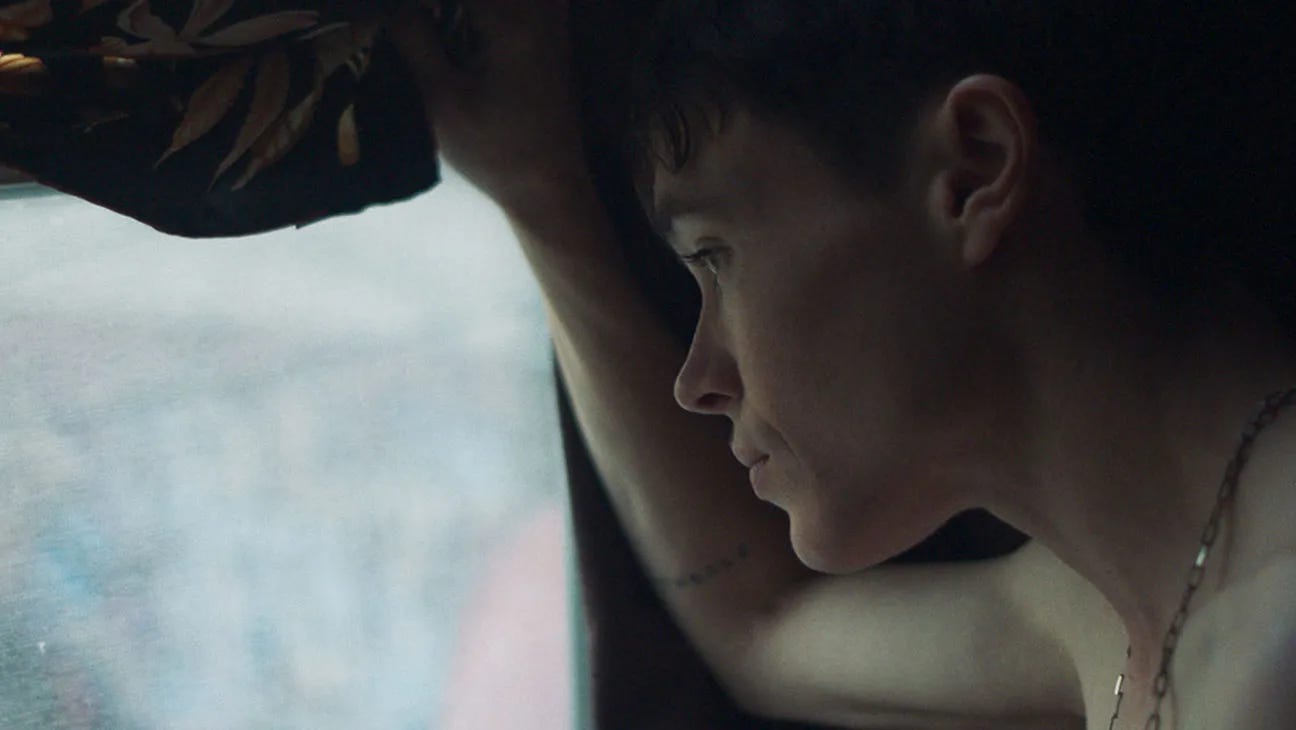
“Close To You” (⭐ ⭐) – Elliot Page stars in a drama about a trans man dreading his first visit to his suburban family in four years. It’s Page’s first major acting role since announcing his own transition in 2020, and the performance is very affecting and obviously close to home. The problem is that all the dialogue has been improvised (Page and director Dominic Savage share a “story by” credit), resulting in far too many scenes that play out as a series of awkward banalities. (A point to consider: Winging it doesn’t so much guarantee the illusion of real life as a performance of real life.) The choice to make the hero’s family members – with one notable exception – self-consciously progressive is smart, exposing the well-meaning difficulties and unintended slights loved ones can visit on someone who just wants to be seen as a person. Still, it’s a better movie than the recent, similar “Mutt” – one comes away having spent 100 empathetic minutes in a trans man’s shoes and reminded that Page has a face and a presence the camera is naturally drawn to. He’s a movie star, and the industry would do well to treat him as one. (Seeking distribution.)
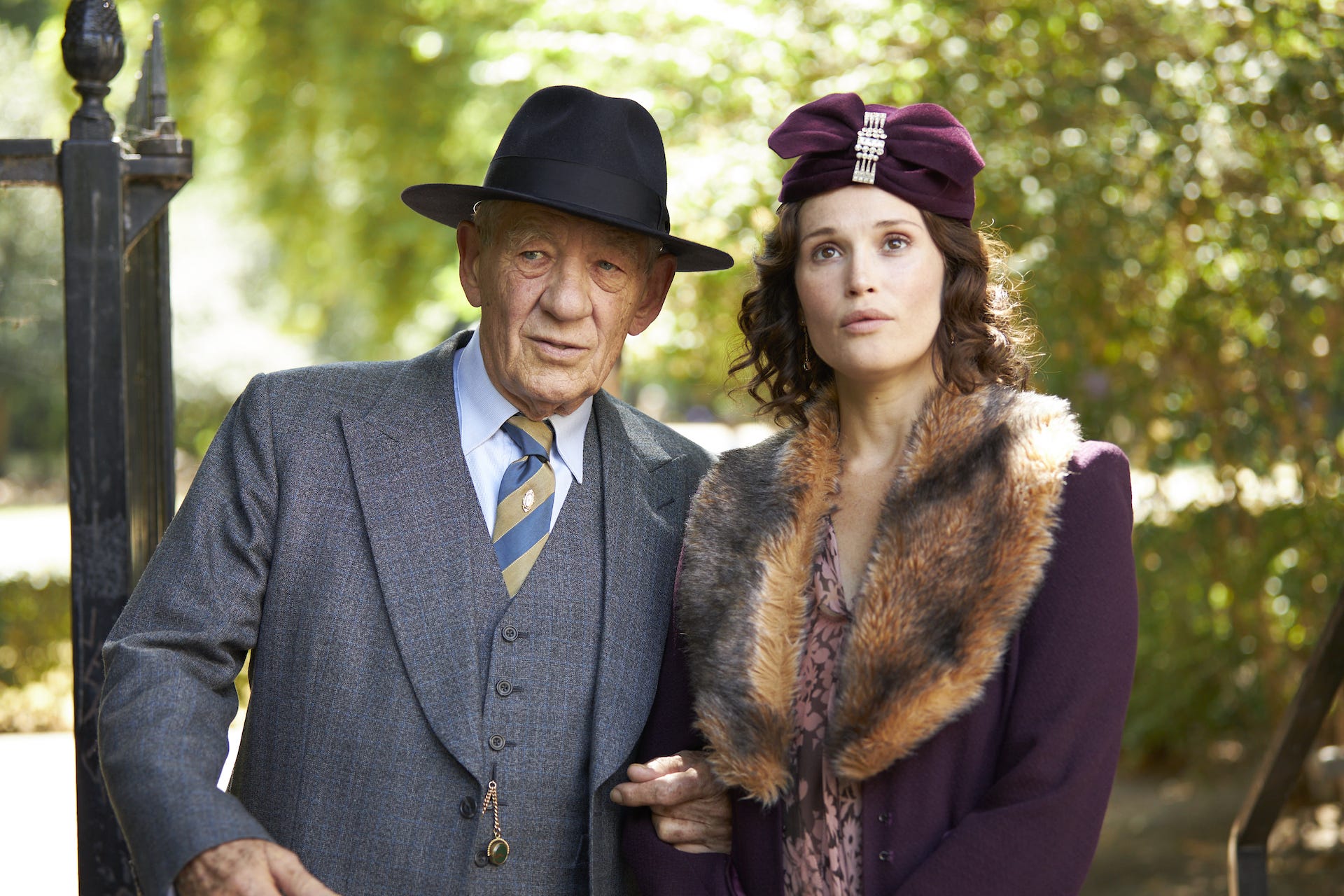
“The Critic” (⭐ ⭐ ⭐) – Good, dark fun from director Anand Tucker (“Girl with a Pearl Earring”), with Ian McKellen (above left) playing a fearsome old dragon of a drama critic in 1930s London, Gemma Arterton (above right) as an actress receiving the sting of his lash, Mark Strong as a titled newspaper baron, and a series of feints, deceptions and increasingly nasty doings that lead the plot to the edge of tragedy and then beyond. With a script by Patrick Marber (“Closer,” the not-dissimilar “Notes on a Scandal”), Romola Garai and Lesley Manville in support, and one of Sir Ian’s juiciest roles since “Gods and Monsters” in 1998, it’s a class act all around. As an added post-film surprise, McKellen greeted the Toronto crowd by Zoom from London. (Seeking US distribution.)

“The Dead Don’t Hurt” (⭐ ⭐ 1/2) – A western from director-screenwriter-star Viggo Mortensen, and a substantial improvement from his 2020 behind-the-camera debut, “Falling.” He plays a Danish immigrant farmer and sheriff of a small, ornery Nevada town run by a powerful judge (Danny Huston) and local rancher (Garrett Dillahunt). The real reason to see the movie is Vicky Krieps (“Phantom Thread”), above, as Mortensen’s wife, a free-spirited French Canadian whose individuality and strength represent a threat to the macho frontier code. A convoluted two-part chronology makes the drama rougher sledding than it needs to be – there’s a simpler, more elemental tale to be uncovered here – and the main antagonist (Solly McLeod) is a cartoon of sagebrush villainy, but the scenes between the immigrant husband and wife have a freshly felt tenderness and honesty that’s rare for the genre. Viggo’s getting better at this. (Seeking distribution.)

“Do Not Expect Much from the End of the World” (⭐ ⭐ ⭐ 1/2) – Romania’s prolific prankster Radu Jude made one of my favorite movies of 2021, “Bad Luck Banging or Loony Porn,” and his latest is a freewheeling, nearly three-hour comedic essay on filmmaking, the gig economy, Tiktok, selling out, staying free, government propaganda, corporate propaganda, and the perils of driving in Bucharest. Anchored by the gloriously foul-mouthed Ilinca Manolache (above) as a low-level production assistant with a sideline in anti-right wing parody videos, it culminates in a heroic single-shot attempt to make a corporate safety video that becomes a dourly funny definition of everything corrupt and collapsing in Romanian society. Slapdash and seemingly stitched together on a rusty sewing machine, it’s also more alive than anything else I’ve seen here. Featuring cameo appearances by Nina Hoss and director/pugilist Uwe Boll. (Picked up for theatrical and streaming distribution by MUBI.)
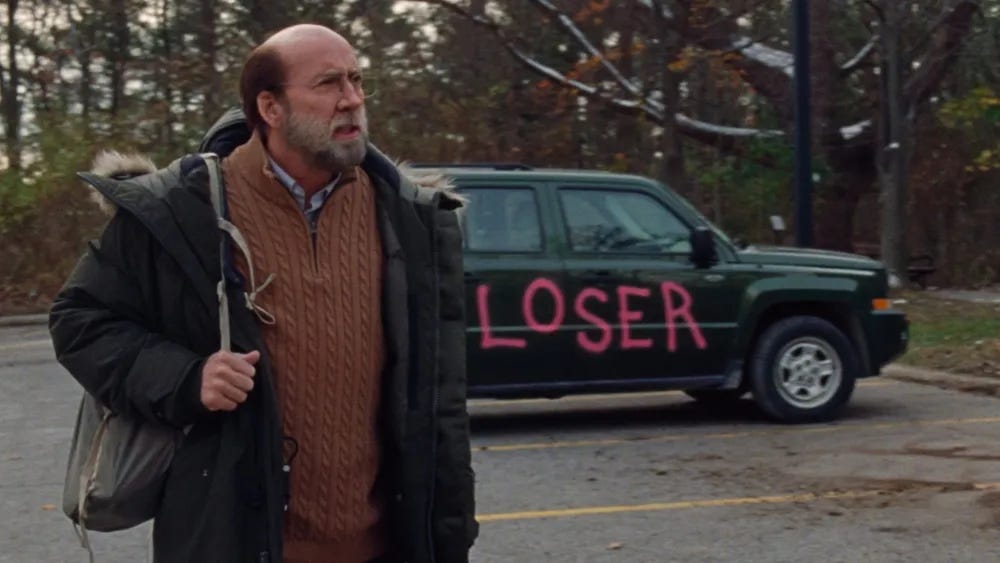
“Dream Scenario” (⭐ ⭐ 1/2) Nicolas Cage plays a nebbish professor who inexplicably starts turning up in people’s dreams, first as a bystander and then rather more frighteningly. Surreal and slick, with echoes of the Coens, Charlie Kaufman, and Ari Aster (who produced), it’s a Kafkaesque parable of fame and its discontents. Writer-director Kristoffer Borgli has one great idea and then has to develop it across the length of a feature film, which he does with diminishing returns. Cage is Cage and plays to his legend – it would be interesting to see this done with a less mannered performer – but a scene between the professor and a turned-on admirer (Dylan Gelula) is a small masterpiece of comic discomfort. (In theaters November 10.)
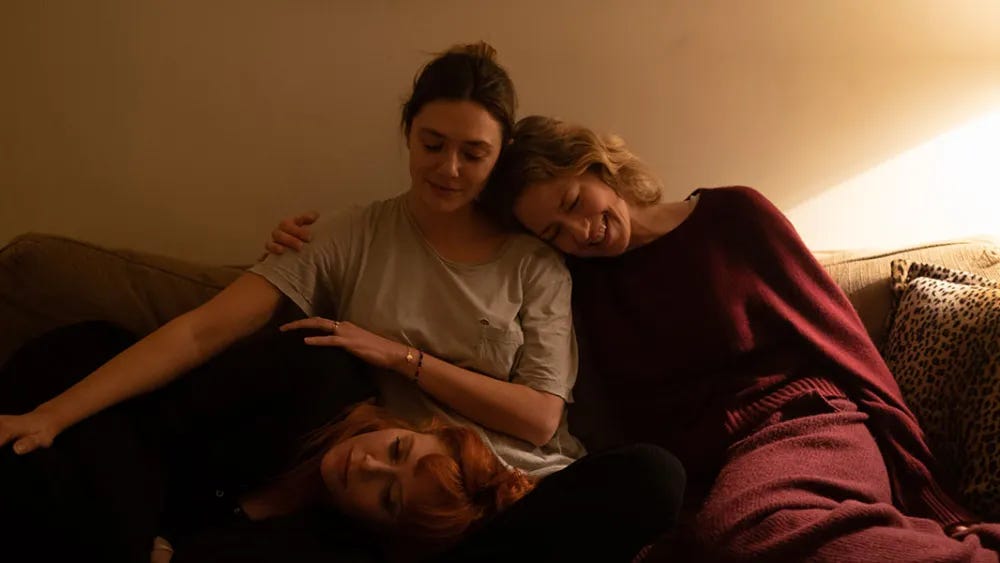
“His Three Daughters” (⭐ ⭐ ⭐ ⭐) – My favorite film of the festival so far and the one on which I have the least distance. Azazel Jacobs makes his most cohesive film since 2008’s “Momma’s Man” (which cast the director’s father, avant-garde film titan Ken Jacobs, as the hero’s father) and also his simplest: Three grown sisters drive each other crazy in a small Manhattan apartment while an unseen patriarch lies dying in a nearby bedroom. To anyone who’s dealt with DNR forms and hospice nurses, the movie will feel like known territory, and anyone whose sibling relationships are… fractious may wonder why they’re paying for what they can get at home for free. BUT: the sisters are played by Carrie Coon (intense Brooklyn control freak), Elizabeth Olsen (New Age-y new mom), and Natasha Lyonne (slacker pothead), and the actresses work together with a beautifully combative ease that feels instinctual – Olsen in particular has rarely been so good. Jacobs takes a few risks in the final ten minutes that nevertheless pay off; this most eccentric of filmmakers has entered a new pitch of confidence and with luck will reach the wider audience he deserves. A heartbreakingly good movie given its production constraints. (Seeking distribution.)
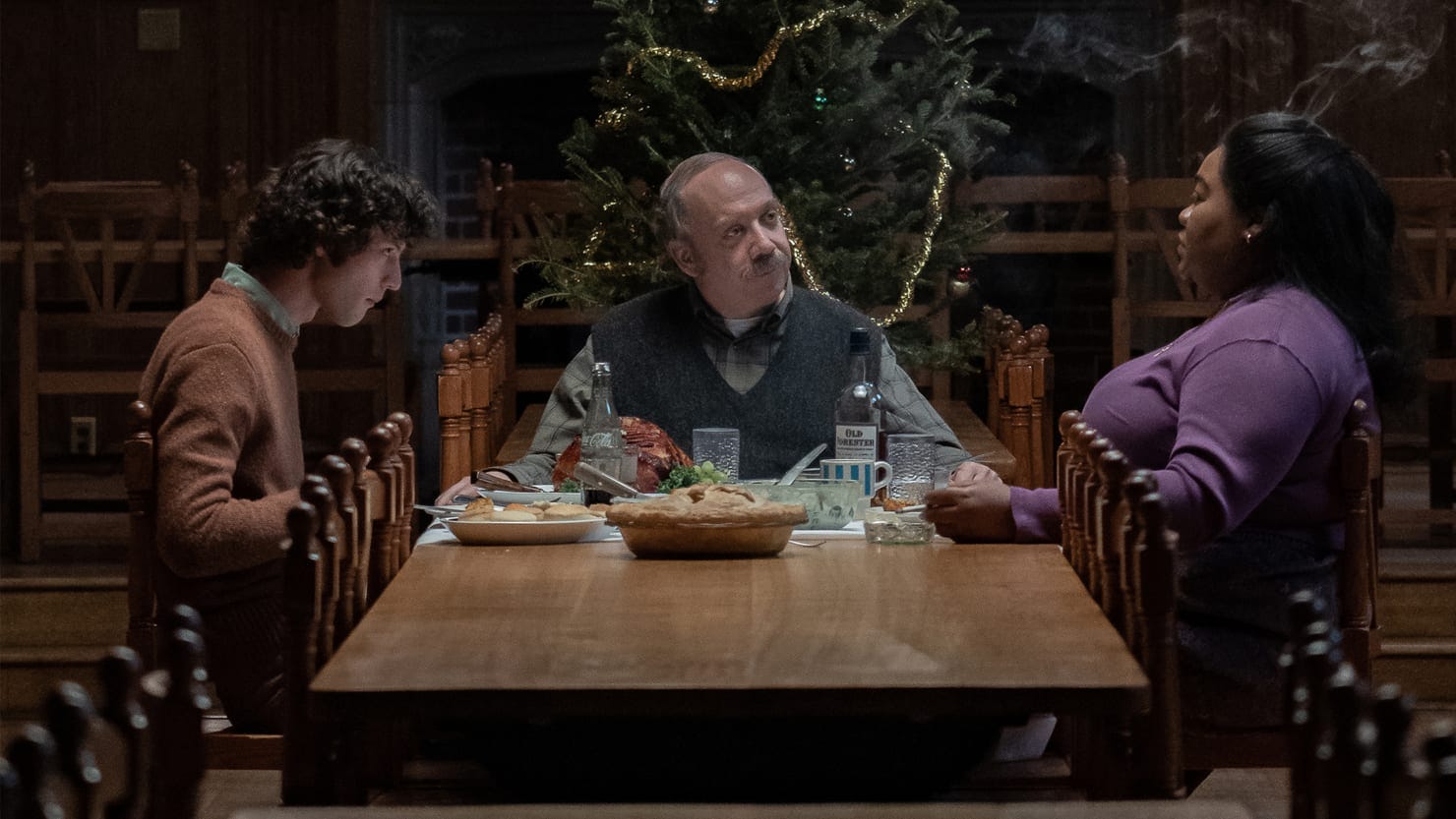
“The Holdovers” (⭐ ⭐ ⭐ 1/2) – After the ambitious misfire of “Downsizing” in 2017, director Alexander Payne retreats to familiar turf: Comic studies of misanthropes and misfits coming to terms with their dubious life choices. This is not a bad thing. Paul Giamatti – so good in Payne’s “Sideways” – plays a hidebound prep school classics teacher forced to babysit a truculent student (newcomer Dominic Sessa) over the 1970 Christmas holiday; they’re joined in loneliness by the school’s cook (Da’Vine Joy Randolph), who’s mourning a son killed in Vietnam. The interplay between the three leads is snippy and invigorating; Payne excels at characters who are simultaneously caustic, self-aware, and doomed to repeat their own mistakes unto eternity. (The film’s writer is David Hemingson.) Speaking as someone who was there, the production detail in the film’s recreation of early ‘70s private school is awe-inspiringly tweedy. (It was filmed at Andover and Deerfield, with a side-trip to the Wakefield Bowladrome.) Not a groundbreaker but a deeply pleasurable human comedy. (In theaters November 10.)
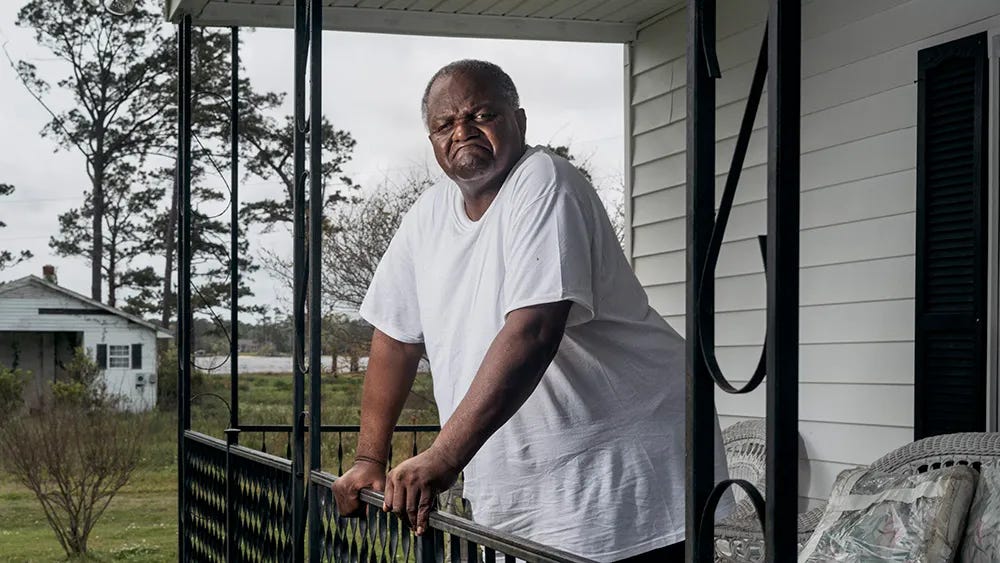
“Silver Dollar Road” (⭐ ⭐) – A documentary by the gifted Raoul Peck (“I Am Not Your Negro”) that never manages to land its punches. In telling the story of how the Black residents of a North Carolina enclave have fought the taking of land they’ve owned since the end of the Civil War, Peck sketches out a complicated family tree, introduces us to a number of good people, and outlines a slow-motion crime by government and corporate fiat. Comparisons to last year’s “Descendant” are unavoidable, but that film had Zora Neale Hurston’s archival footage to provide it with historical perspective and a narrative spine. The absence of a visible villain – no one on the land developer’s side would go on record or even answer the phone – is both part of the point and a dramatic flaw this noble movie never overcomes. (In theaters October 13 and on VOD October 20.)
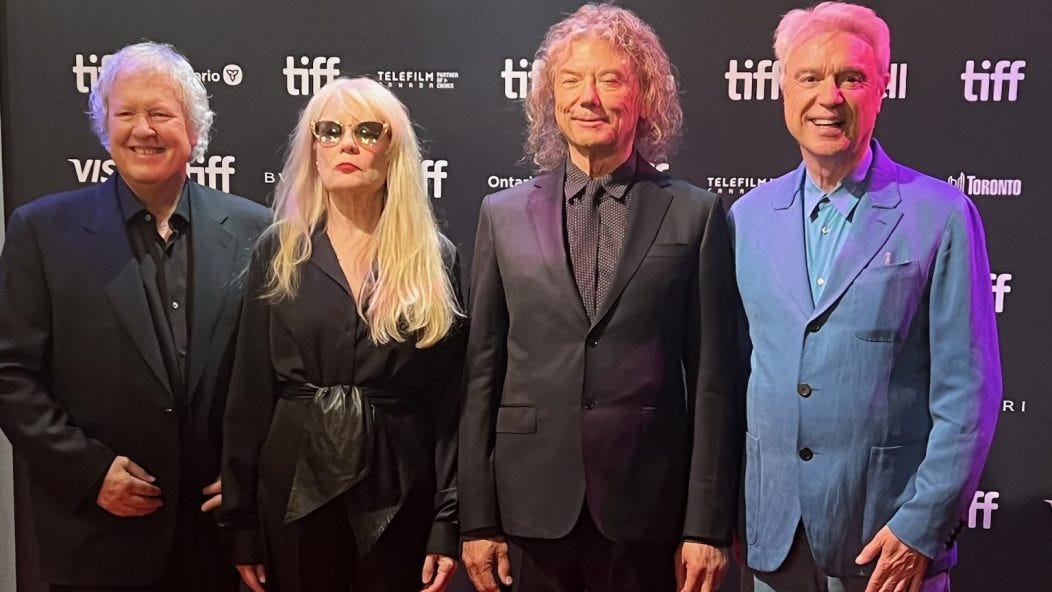
“Stop Making Sense” (⭐ ⭐ ⭐ ⭐) – For its 40th anniversary, the Talking Heads concert film was simulcast on IMAX screens around North America on Monday night, graced with a new sound mix from bandmember Jerry Harrison that takes full advantage of modern sound system technology. The screening was followed by one of the more entertainingly bizarre post-film Q&As I’ve ever seen. Interviewer Spike Lee barked out enthusiastic non-questions (“The big suit – go!”) while the four assembled Heads – together for the first time in decades – provided the anti-chemistry of four people who once liked each other a long time ago. David Byrne on the far left was largely unacknowledged by the rest of the group, Tina Weymouth on the far right stared at the floor, and Jerry Harrison and Chris Frantz in the middle provided the most cogent responses. The movie? It’s still great and it sounds fantastic. The band? Well, you can’t go back to CBGBs anymore. (On IMAX screens September 22 and regular theaters September 29.)
Comments? Please don’t hesitate to weigh in.
If you enjoyed this edition of Ty Burr’s Watch List, feel free to pass it along to others.
If you’re not a paying subscriber and would like to sign up for additional postings and to join the discussions — or just help underwrite this enterprise, for which the author would be eternally grateful — here’s how.
You can give a paid Watch List gift subscription to your movie-mad friends —
Or refer friends to the Watch List and get credit for new subscribers. When you use the referral link below, or the “Share” button on any post, you'll:
- Get a 1 month comp for 3 referrals
- Get a 3 month comp for 5 referrals
- Get a 6 month comp for 25 referrals. Simply send the link in a text, email, or share it on social media with friends.
There’s a leaderboard where you can track your shares. To learn more, check out Substack’s FAQ.


